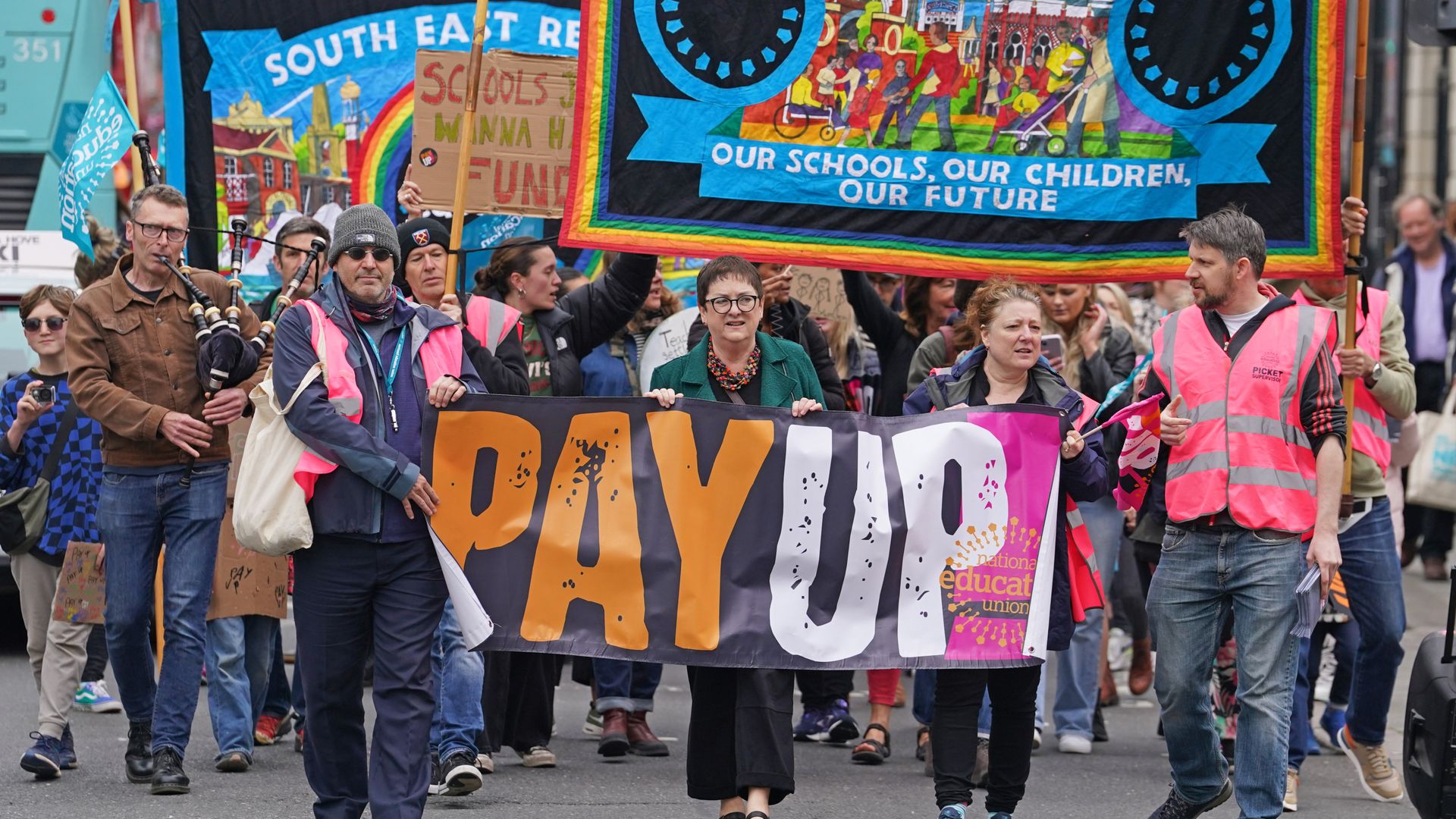Teachers have been told it is “not the right time to strike” after the largest education union said it will ask its members to reject the government’s pay rise offer.
The National Education Union (NEU) will launch an indicative ballot of its members from 1 March until 11 April over the government recommendation of a 2.8% pay rise for teachers in England.
Speaking to Anna Jones on Sky News Breakfast, Culture Secretary Lisa Nandy urged teachers not to strike, arguing that the new Labour government has taken “more action than the Conservative government took in the last 14 years”.
Politics latest: Reeves heading to China for economic talks despite pressure to cancel trip
In an appeal to teachers, she said: “I know life has been very, very tough over recent years, but I’d urge them to think about the fact that in six months, we’ve taken more action than this Conservative government took in the last 14 years.
“We’ve come forward with a pay offer to improve their living standards.
“But more than that, when I speak to teachers across the country, including at my little boy’s school, what they want is to make sure that we relieve the pressures on teachers so that they can get back to the core job of teaching, so that they can deal with the children in front of them, particularly the post-COVID generation who have so many challenges.
“I would just say to the teaching workforce, I know it’s been tough, but we need to work together in the interests of children. We’re confident that we’ve got the right answers working together with them.
“Now is not the time to strike. Now is the time to move forwards.”
The threat of teacher strikes comes after the government recommended a 2.8% pay rise for public sector workers, including NHS staff, some of whom were critical of the offer.
The Royal College of Nursing (RCN) has said the figure amounted to “as little as £2 extra a day” and urged the government to open talks to “avoid further disruption and ballots”.
Last September, the Aslef train driver union accepted the government’s offer of a 5% backdated pay rise for 2022-23, a 4.75% increase for 2023-24, and a 4.5% increase for 2024-25.
They were joined by the RMT union, which represents rail workers, who accepted a one-year rise of 4.5% at Network Rail and increases at train operators of 4.75% for the last year and 4.5% for 2024/25.
Teachers and headteachers in England received a 5.5% pay rise in September last year.
Daniel Kebede, the general secretary of the NEU, has argued that the government’s current proposal of 2.8% for 2025/26 is “not sufficient” to address teacher shortages.
“The current proposal of 2.8% is not sufficient to even start to address the crisis in recruitment and retention,” he said.
“The suggestion that an unfunded pay award can be paid for by making ‘efficiencies’ is an insult to a profession who have already endured 14 years of austerity.
“No teacher or leader will be able to identify efficiencies without cutting staff or resources or both.”
He added: “Thousands of teachers voted for the change that Labour promised for education. They promised to invest in education, to recruit 6,500 teachers and to value education and to secure the life chances of our children.
“We need to see their commitment in deeds as well as words.
“Sentiment alone will not fill the excessive teacher vacancies nor will it deliver the world-class education our children deserve.”
The Department for Education (DfE) strongly hit back at the union’s decision, calling it “extraordinary”, while Downing Street also urged teachers not to “put children’s learning at risk” by going on strike”.
The DfE said a 2.8% rise would “maintain the competitiveness of teachers’ pay despite the challenging financial backdrop the government is facing”.
A DfE spokesperson said: “This is an extraordinary decision.
“In three years, teachers have had a combined pay increase of over 17%.
“As schools and families continue doing everything they can to improve attendance, and after the millions of school days lost through both the pandemic and recent industrial action, union leaderships need to think long and hard about whose interests they are putting first.”
Read more:
Truss sends cease and desist letter to Starmer over claims she ‘crashed the economy’
Reeves intervention ruled out as pound slides further
Follow our channel and never miss an update
NEU members will be asked whether they would be willing to take industrial action if the government does not commit to a significant and fully funded pay rise.
If members back action, delegates at the NEU’s annual conference in April could decide to proceed to a formal ballot that will take place in the summer.





